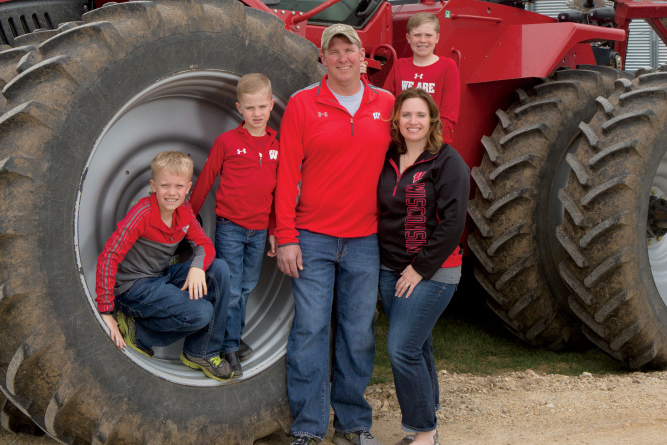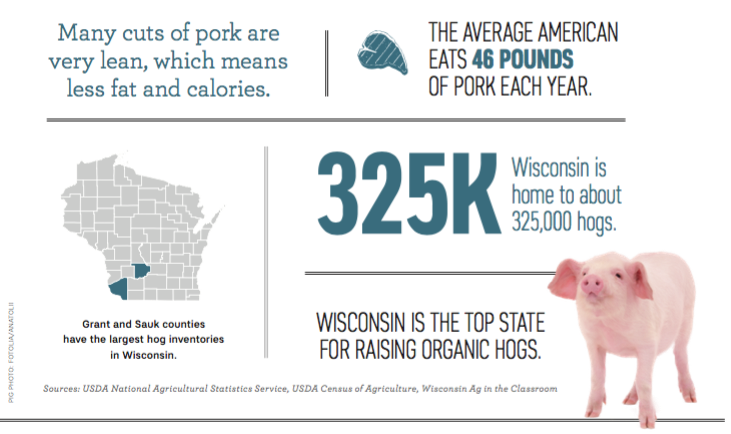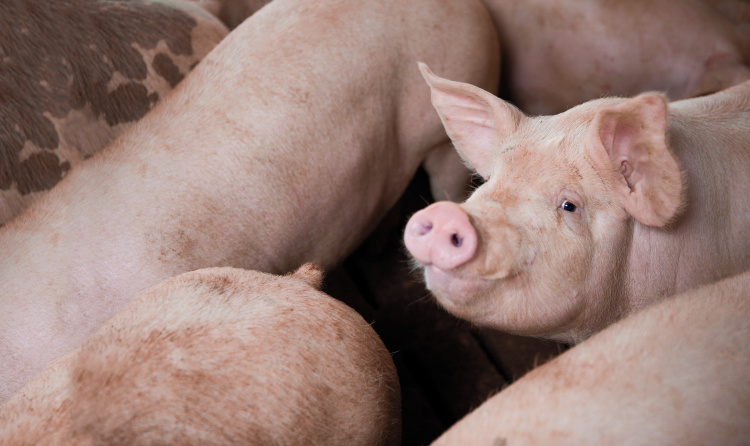Home > Wisconsin > Wisconsin Farm to Table > Wisconsin Farm Families Raise Pigs and More
Wisconsin Farm Families Raise Pigs and More
In partnership with: Wisconsin Department of Agriculture, Trade and Consumer Protection.
Wisconsin may be known as a dairy state, but pigs also play a major role in the state’s agriculture industry. The history of pork production in the state runs deep.
The 1920 Census of Agriculture showed that 80 percent of all farms in the state had pigs, with a total of 1.6 million swine. Those animals not only provided meat for home consumption, but also provided the pork for sausage makers who fed the taste of the state’s first- and second-generation Polish and German populations.
Today, there are fewer farms producing pork in the state, and total swine numbers are lower than the peak years of the mid-1940s that saw more than 2.5 million pigs on Wisconsin farms. But the industry continues to thrive – contributing to the overall economy and creating thousands of jobs.
The state is home to a wide variety of swine operations, from small to large and all types of production. Some smaller and mid-sized producers continue to feed the considerable demand for market pigs from both local and national meat processors. Others focus on producing young pigs, which are moved to other farms after weaning until they reach market weight.
Recently, there has been growing interest in Wisconsin as a place to raise pigs, notes Tammy Vaassen, executive vice president of the Wisconsin Pork Association (WPA). Ironically, it has to do with the fact that the state is not hog dense.
“Producers are able to maintain distance from one pig farm to another farm,” she says. “By doing that, we help to reduce the exposure to potential pig diseases that can transfer between closely spaced farms.”
While many pig farms have stayed small, other Wisconsin family farms have expanded to take advantage of technology and provide stability for future generations. Wolf L&G Farms in Lancaster is a prime example.

Commitment to Quality
Shannon and Melissa Wolf have been operating Wolf L&G Farms in Lancaster for more than a decade, taking over management from Shannon’s parents. With gradual, planned growth, the farm currently includes a 1,200 sow farrow -to-finish (birth to market) hog operation, and 300 beef cows, over 1,000 acres of corn, 300 acres of soybeans and 200 acres of alfalfa. The expansion has not only made room for the family; it has also been good for the surrounding area. In addition to family members, the Grant County farm also employs seven full-time people from within the local community.
Raising food is a responsibility the Wolfs take seriously. The farm is certified in the Pork Quality Assurance Plus® program and has hired an outside auditor to do a site assessment for their hog operation. This provides an extra set of eyes on ways they might improve animal care, which is key to the farm’s success.
Those efforts fit with their personal farming philosophy: Always be open to change. Don’t cut corners. Produce the best, always.
Tech Drives Improvement
Technology helps them meet those goals. “Our hogs are housed inside so that we can control their environment,” Melissa Wolf says. “We keep the pigs cool in the summer, and run heaters in the winter to protect them from harsh temperatures. We have an electronic feeding system in our sow barn, which helps us monitor how much they are eating and allows us to manage herd health.”
The farm’s field machinery is equipped with GPS and variable rate applications, which maximizes crop yields while following a nutrient management plan for manure and fertilizer applications. These technologies are also used during planting and harvest.
Technology like that being used by the Wolfs drives both economic and environmental sustainability, Vaassen points out. Today, each pound of pork produced requires 41 percent less water and 78 percent less land than it did 50 years ago. In addition, the carbon footprint for each pound of pork produced has shrunk by 35 percent.
 Cultivating Conversations
Cultivating Conversations
Consumer education requires ongoing efforts for agriculture producers. Working with WPA, Wolf conducts virtual tours in the farrowing (birthing) barn for elementary schools from around the state, focusing on the safe and humane practices used in modern production.
“There are fewer consumers and their families who have any connection to the farm, resulting in lack of understanding of farming practices,” she says. “We follow strict biosecurity rules on our farm to prevent disease introductions to the pigs, so we don’t allow visitors into our barns. But through virtual technology, we are able to connect with hundreds of students to bring the pigs and barn to their classroom.”
WPA is looking for ways to expand that program, while also focusing on other areas of consumer education.
“We attend various consumer events throughout the year, sharing information on how pigs are raised today,” Vaassen says. “We also talk about the nutritional benefits of pork, provide easy-to-prepare recipes, and remind consumers that pork chops and roasts can be cooked to 145 degrees Fahrenheit for a juicy, tender and safe meal. We’re fortunate to represent a great group of farmers, like the Wolfs, who are dedicated to providing wholesome and delicious pork to consumers.”




